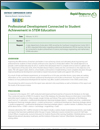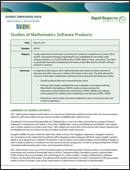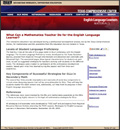SEDL's Free Briefs and Reports for Mathematics and Science
Mathematics and Science
Briefs and Reports
SEDL Insights, Vol. 1, No. 4: Teaching Mathematics Conceptually (2014)
Mathematics instruction in the United States has historically focused on procedures, facts, and algorithms. Because of that focus, mathematics instruction, in essence, becomes lessons in arithmetic and efficiency. While there are promising changes occurring in mathematics instruction, we still need to help both teachers and students develop a more conceptual understanding of mathematics. This issue of SEDL Insights helps educators shift from helping students memorize rules to facilitating a deeper understanding of mathematics concepts.
Engaging Diverse Learners Through the Provision of STEM Education Opportunities: Southeast Comprehensive Center Briefing Paper, May 2012 (2012)
Science, technology, engineering, and mathematics (STEM) are viewed as fundamental elements in preparing our next generation to compete in the 21st century economy. This brief examines how various states are seeking to improve access to STEM education opportunities for diverse learners to meet state and federal education priorities and funding requirements.
Science, technology, engineering, and mathematics (STEM) are viewed as fundamental elements in preparing our next generation to compete in the 21st century economy. This brief examines how various states are seeking to improve access to STEM education opportunities for diverse learners to meet state and federal education priorities and funding requirements.
Rapid Response: Professional Development Connected to Student Achievement in STEM Education (2012)
The Southeast Comprehensive Center at SEDL produced this resource in response to a request by a state department of education for information about professional development for teachers on student achievement in science, technology, engineering, and mathematics (STEM) education.
The Southeast Comprehensive Center at SEDL produced this resource in response to a request by a state department of education for information about professional development for teachers on student achievement in science, technology, engineering, and mathematics (STEM) education.
Secondary Content-Area Literacy: Time for Crisis or Opportunity for Reform?: Texas Comprehensive Center Briefing Paper, Number 12 (2012)
This brief examines the critical need to implement instruction at the secondary level around adolescent, or content-area, literacy. The challenge is to connect the teaching of literacy to the rest of the secondary education improvement agenda.
This brief examines the critical need to implement instruction at the secondary level around adolescent, or content-area, literacy. The challenge is to connect the teaching of literacy to the rest of the secondary education improvement agenda.
Rapid Response: Studies of Mathematics Software Programs (2011)
This resource was developed in response to a request for information regarding the use of the My Math Lab project and similar math software programs (i.e., Plato, Aleks, Math in Focus, and others), and information on the effectiveness of math software programs in practice. In response to this request, staff conducted web-based and hand searches of literature and other resources to obtain information on the topic. The staff selected for inclusion in this report mathematics software products based on the following criteria: Specific products that were requested by the client, products with studies available that were evaluated in accordance with the What Works Clearinghouse (WWC) evidence review protocol for elementary school mathematics interventions (WWC, 2009d) and evidence review protocol for middle school mathematics interventions (WWC, 2009e), and products for which studies have been published in peer-reviewed journals and in other publications.
This resource was developed in response to a request for information regarding the use of the My Math Lab project and similar math software programs (i.e., Plato, Aleks, Math in Focus, and others), and information on the effectiveness of math software programs in practice. In response to this request, staff conducted web-based and hand searches of literature and other resources to obtain information on the topic. The staff selected for inclusion in this report mathematics software products based on the following criteria: Specific products that were requested by the client, products with studies available that were evaluated in accordance with the What Works Clearinghouse (WWC) evidence review protocol for elementary school mathematics interventions (WWC, 2009d) and evidence review protocol for middle school mathematics interventions (WWC, 2009e), and products for which studies have been published in peer-reviewed journals and in other publications.
What Can a Mathematics Teacher Do for the English Language Learner? (2009)
Based on a 2006 professional development session for math and ESL specialists, this online interactive document includes teaching strategies for ELLs at various levels, critical components to include when designing math lessons for ELLs, and a list of relevant resources.
Based on a 2006 professional development session for math and ESL specialists, this online interactive document includes teaching strategies for ELLs at various levels, critical components to include when designing math lessons for ELLs, and a list of relevant resources.






